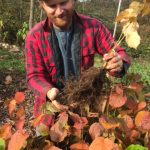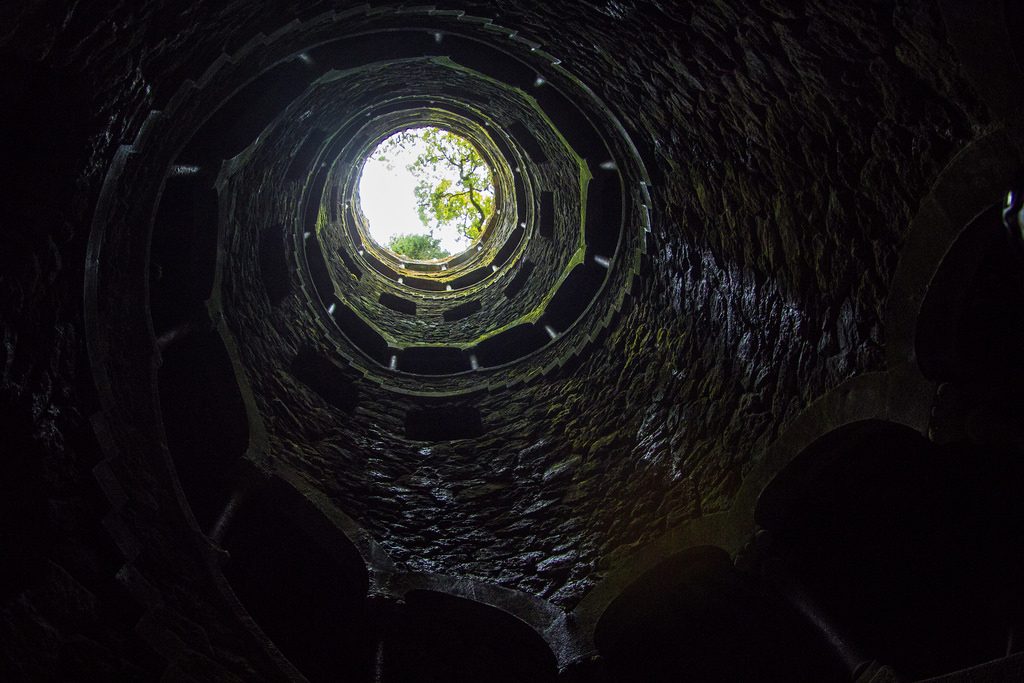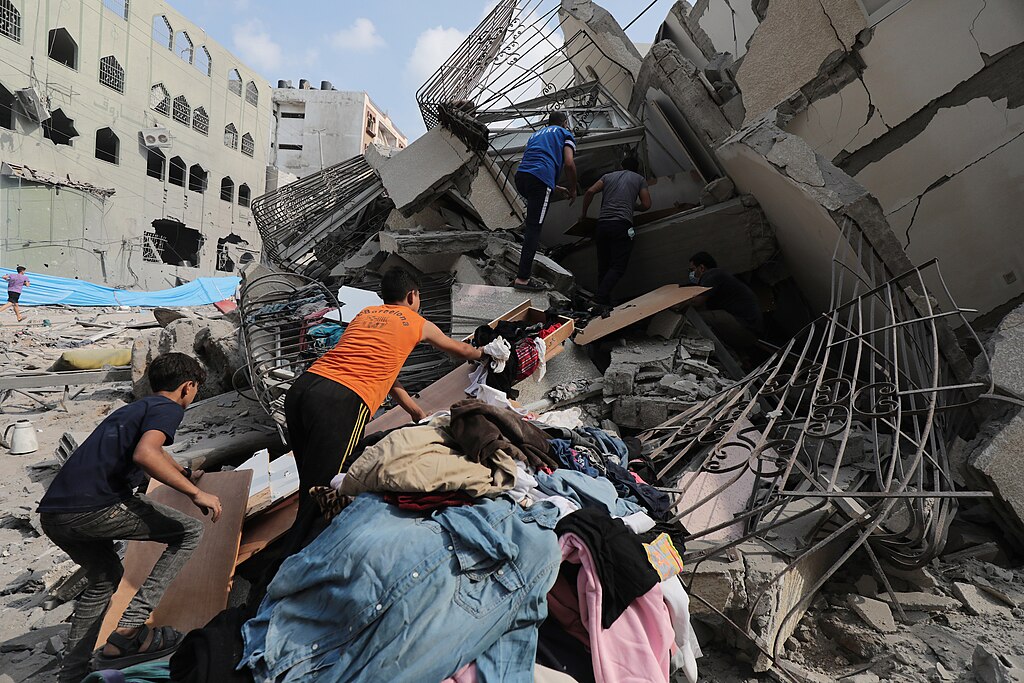The River Threshold
THE ENDING CAME three years ago, from the day before we went to the river. One version of the ending, anyway. She and I sat at a picnic table near a stream with a therapist who was also my uncle, and we said out loud in the summer June air that we couldn’t give what the other wanted. She said she couldn’t live with me anymore and be who she wanted to be. I said I couldn’t live indefinitely separate and fragmented. We said these things for the purpose of freeing each other, though freedom didn’t liberate like we thought. There have been numerous endings. Another ending came down by the river, three years and a day later.
I’ve come to learn that transitions don’t often look like crossing a straight line. We circle back, or in some way forward, because circling is rarely a straightforward repetition of what came before. Instead, it’s a need to follow-up, continue, revolve. Grief is the emotion and the practice that accompanies irreversible transition – like final goodbyes, certainly all kinds of death, even births because all beginnings start with an ending.
Grief never completely goes away either, circling like water cycles, tears turned to thunderstorms, so pieces left from these endings didn’t get cleaned up, growing back together again in a hurtful dark. John O’Donohue, poet-priest from Ireland, pictured this process like being “ambushed” in the middle of daily tasks, when you think you finally have your heart back. Ambushes, small and large, kept surprising me, so I knew I needed to transition again, or make visible a practice of my transition. I felt ready to cross the threshold into the next time of my life, to leave behind an architecture I no longer lived in but perhaps occasionally squatted in, a memory palace where particular dreams still had a haunting life. As far as I was concerned, those dreams were welcome to remain encamped there, but I needed to move out.
Another poet, David Whyte, once remarked that the greater difficulty of a relationship’s end may not be leaving the person but leaving the shared dreams. No matter who or what comes next, he said, “no matter what species of happiness you would share with them – you will never, ever share those particular dreams again, with that particular tonality and coloration.” The end is an extinction.
But I was ready, really actually ready, for a new lease on a house of life. Life was moving on, as it always does, and I was mostly living it, though parts of me weren’t. I needed help to step through the doorway from this dying house. So two friends came to help me cross the threshold.
***
DAVE AND KYLE have been involved in all this from the beginning, from building that house, talking about its construction, to sitting in its loneliness with me, now helping me move out. Kyle and his wife Ginger even officiated the wedding, the ceremonial moving in, talking in the thick damp Arkansas heat about marriage as coevolution, which confirms the end is indeed an extinction. Kyle also first offered me the language of architecture for understanding the close intimacy, the careful maintenance, of inhabiting a marriage, and the many painful ways its borders can be violated. Dave was at the wedding too, reading Wendell Berry’s “The Country of Marriage,” a long poem about marriage as a place to adapt to, where general affection becomes particular love and an unfamiliar landscape becomes home. Country is a distinct metaphor from architecture, though similar enough that selectively re-reading the poem now eerily surveys a different country. Or perhaps the same one, now seen with grief after exile, anguish after extinction.
Instead of moonlit longing and restful union, consider insomniac nightmares held captive by the one you love: “I dream of you walking at night along the streams . . . You are holding in your body the dark seed of my sleep.”
Or the dizzying unknowing of why we were drawn together at all, times when no words came, ambushed instead with unexpected visions:
Was it something I said
that bound me to you, some mere promise
or, worse, the fear of loneliness and death?
A man lost in the woods in the dark, I stood
still and said nothing. And then there rose in me,
. . . the words of a dream of you
I did not know I had dreamed . . .
And then, with a twist of finality, twisted from the abundant freedom of self-release into the suffocating abandonment of drowning:
What I am learning to give you is my death
to set you free of me, and me from myself
into the dark and the new light. Like the water
of a deep stream, love is always too much.
Grief can do that to you, make you question everything you thought you knew or understand, like poems or people. Did I hallucinate all that tenderness? Those times that felt easy and comfortable? Did I make that whole country up?
Dave has crossed through this country in his own life. I’ve sometimes been jealous of his journey because he was much less responsible for its ending than I am for mine. But I no longer want to linger on the sharp fault line edges of my flaws, though the voices in my head, sometimes spoken in her tone, remind me of who I’ve been when I tried to defy my failings. It always takes at least two, but could I even be good, the voices asked, when I’m so imperfect? Doesn’t imperfection mean I deserve what I got? “Flickers of guilt kindle regret/For all that was left unsaid or undone,” wrote John O’Donohue about the heat I’ve felt. Guilt is a real condition, regret a necessary emotion, but I no longer hate myself and I want to keep it that way.
My friends came for a June weekend and we talked, hiked, looked at my gardens and the nursery where another friend and I grow trees and ourselves. That first night, successively drinking whiskey, bourbon, and gin, I told them that I couldn’t shake the image of threshold, its old word-roots grown from a double sense of treading and separating, walking and winnowing. Crossing over something into somewhere else, returning changed to a changed place. In her manual on power, Cyndi Suarez reminds that rites of passage always “begin with a threshold – a challenge one cannot meet without transcending one’s current idea of oneself”: a strategy for meeting needs no longer works, a story no longer rings true, an initiatory move into a new age. That transcendence was what I was looking for. The earth also has thresholds, from one biome to the next or when slow small disturbances finally crest into quick changes. That’s where I was, at the biome doorway. I needed to physically walk through a threshold, to separate myself from the past by treading, not just talking about it.
They listened, asked questions. Dave wondered if there was anything else I needed to say to her. I knew there was, especially towards the very end, but I’d never really let myself speak directly to her those words out of fear of making it worse, out of fear of sounding like I was avoiding myself. I spoke countless things to her in our short shared life: some beautiful, some vulnerable, some cynical, some that still taste bitter in the mouth. After too much time defending and deflecting, the bitterness baked into a story solely filled with all my dysfunctions and imbalances. Usually all I could see were those sharp fault lines, all my worst moments carved in stone. Dave told me that a grief ritualist suggested to him that he say his unsaid words out loud, as if to his former partner but directed to a rock. Your soul, the ritualist explained, doesn’t know the difference between the firmness of the rock and the firmness of her. Your soul simply needs to speak. Maybe, Dave added, I also needed to say out loud a counter-narrative to the bitter stone story.
I told them I wanted to be by the river. I’d spent a lot of time there, crying my grief into the flow, ritualizing my return to this chosen home, joyful play with friends floating in the current. The river felt right. Partly because I think emotions move like water, and grief is like their river. My friend Karla McLaren, loving guide to emotions and empathy, says that grief is unlike sadness, which arises to help us let go of what’s no longer working but we could choose to hold onto. Grief arises when something is actually lost, a never-to-return loss, taking us down to the deep places because they are the only places left to go. Grief moves at extinction events, when things die. I decided to take grief to the South Fork of the Shenandoah, to the river I know.
Before Kyle and Dave came, my grief had already moved me to the river, stepping in, lifting my feet, floating further down. I swam over to a shelf of rock cropped out from the steep bank beneath the road. I undressed, reentered naked, with my grief, to midriver where the current swept swiftly. I bore my feet down into the stone and used an old drifting mop handle to anchor myself. I didn’t know what I was going to say, with so little to draw on in my so-called culture, this whitewashed colonizing culture, death-denying and therefore grief-avoidant. Martín Prechtel says that it “is a terrible source of grief in itself to not be able to grieve.” So I made up what I needed to say on the spot. “So be it,” wrote Cormac McCarthy in The Road. “Evoke the forms. Where you’ve nothing else construct ceremonies out of the air and breathe upon them.” I constructed a ceremony out in the otherworld of water and I screamed it under the thudding slip of the current.
Unable to grieve, we’re haunted by what we’ve lost, trapped in-between, never separated enough from the loss to tread to another union. Grief can’t be outrun, outthought, though it can be outsourced, pushing the burden to someone and somewhere else with unforeseen consequences, grieving turned to grievance. Grief is a powerful enough riverine force that it needs ritual, instinctive or inherited, to help responsibly shape its course, charting the changes that always shape our lives. Francis Weller identifies two gifts ritual offers grief: containment and release, the safe holding and the free letting go, a kind of vessel for pouring. Ritual doesn’t erase wounds, doesn’t forever remove the burden of grief, but it maintains and tends, helps us offer gratitude where we can, provides regularity for the maintenance and tending. Repeating a ritual doesn’t mean anything is broken. Maybe my grief wasn’t stuck, just unfinished, maybe never quite done, the ritual never completely over. My desire for a threshold was a need to find my ground, to create an altar or shape, like the river itself. An actual river to correspond to what Weller names “riverbeds in our soul” carved by sorrow.
Maybe, I told Kyle and Dave, we could make a threshold on the ground with sticks or stones like my fault lines, dismantling them once I crossed to recognize the movement. But the image still looked too much like crossing a straight line, even though taking it apart afterwards disrupted the linearity. Whatever the threshold, it needed to be actual, made with the world itself. Dave encouraged me to write down what I needed to say, then burn it. Then Kyle said maybe the river is the threshold. We should cross it and on the far shore make a fire and burn the words there and then cross back over. The flame and the flowing moving place were to be the doorway in time, a grounded sense of time, which moves in cycles and not lines. I said that’s what we needed to do.
***
Moving in circles, I had carried grief to the river before and yelled an underwater ceremony. I had also burned words before, a disposal to signify an end. Nothing broken, only maintenance and tending, moving in circles. Six months after the picnic table ending, I moved out of the Shenandoah Valley to be near family, to separate and heal, maybe to run away. In the ensuing weeks I couldn’t sleep for feverish turning, fitful weeping for her. For months prior I carried a stack of printed emails, ostensibly to provide a thorough history for therapists, but also somehow evidence of chaos-making communication, a paper trail to defend myself.
One late night I evoked the form of a ritual. I typed her a new email, this time in a different tone than before, no more ands or buts or also, simply “Yes, I am sorry.” No excuses or defenses, just responsibility for my part without expectation and a list of all the gifts she’s given me. I told her I felt more broken open than ever before, remembering all the instances when I was demanding, stubborn, condescending, overly assertive in my presence and desires, the ways she then backed away, lay low, withdrew in response. I told her I felt sick at my immaturity and misunderstandings that led to arguments, silences, turnings away. I could taste the dismissing tones in my mouth, could hear their off-key pitch, could feel their imprint in the squint of my face. I told her I was sorry. I apologized because I needed to so I could be who I wanted to be. Because apology is a kind of naming. Because sometimes we do wrong things, and it’s important to admit them. Then I shaved my beard, cropped my hair close, stripped, and made a fire in the yard. I burned the hair and I burned the paper trail so I couldn’t follow it again. The ritual did something only it can do, what talk therapy can’t get at. After sending her the email and burning the papers I slept more soundly than I had in recent memory. I also still had my grief when I woke up.
At some point, a time between the burning in the yard and the burning by the river with my friends, after many more things had been said, she also wanted a ritual to end our marriage. She told me she wanted to break the wine glasses I gave her for our first anniversary, at the homestead where our marriage lived and struggled the longest. After a week of trying to convince myself to do it, I replied no, thank you. I understood, even respected, the intention, but the tone and the act felt nearly violent in the midst of unrequited words, unreciprocated responsibility, and premature for what I actually wanted at the time but felt was no longer possible: to repair all this shit, to resurrect extinct dreams, to be with her light and warmth.
***
I feel some awkwardness writing all this down now, a little embarrassed at the melodrama of it. Perhaps that’s true of intimate moments of transformation told aloud. I’m tempted to temper the personal focus, abstracting my experience into a general meditation on marriage or the grief of this time, from viruses to civil war vibes. But that’s not what this story is about. I’m attempting to write vulnerably, a version of truthfully, without self-pity but with detail to the ritual of grieving heartbreak and mistake. I don’t want to distract from that with generalities or dilute it by drawing attention to all the ways I was hurt too. Each ritualized time felt ordinary, almost exactly natural, an invitation to feel deeply without selfishness. Weller believes that sorrow connects us to the world, the personal to the planetary, and all this personal talk of endings does make me think of the planetary ones. He says that grief finds us through five gates: the reality that we lose everything we love; the places that haven’t known love; the loves we expected but never received; the sorrows of the world globally known but individually felt; the unmetabolized grief inherited from our ancestors. Gates are, after all, thresholds, and all of Weller’s gates involve separation and treading. They all weave together the solitary and the social, the personal and the pandemic.
As for embarrassment, Prechtel affirms that this is grief’s natural and necessary sound, indifferent to misunderstanding. Purposely done, he believes, true and free grieving as an entire people could revive entire cultures, it could “make life more deliciously alive.” And Grief is in fact the best friend of Praise, dwellers in separate chambers of the house of Love, which is the heart. “Grief is praise,” Prechtel vows, “because it is the natural way love honors what it misses.” Both “are very practical versions of love in motion,” a river not a bog.
We can never praise if we never grieve.
***
WE DROVE DOWN out of town to the river, in the gray spray of rain. Parking roadside, we descended a footpath to the wide floodway, filled with trees along a tributary creek. The green of the place met my vision and focused me down under the canopy to the cool wet air and earth. Dizziness clouded me in recent weeks, unable to steady my gaze, as if I were looking through a screen or the long lens of a telescope. But the green and gray, the silvered brown of the river, brought me to attention.
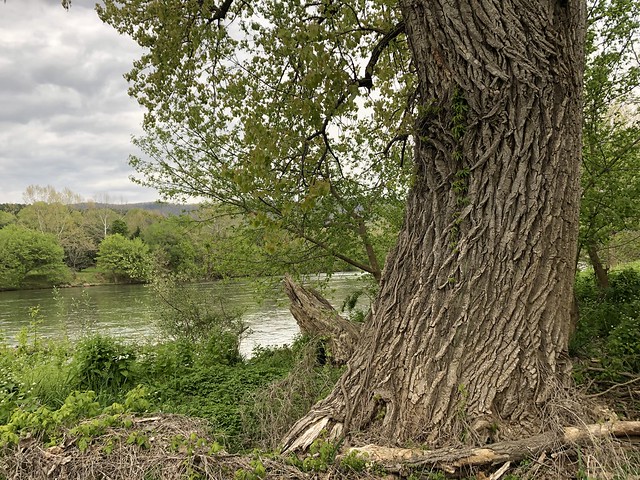
We treaded the soft last path to the bank, colonnaded by rows of Sycamore and Cottonwood, some of the tallest and roundest of either tree I’ve seen in this great valley. Every time I walk that path I stop short before them, each time struck by the size of their immense gorgeous growth. Tree size isn’t a good gauge for age, and both Sycamore and Cottonwood grow very quickly, but those trees have certainly been there a while. Some of the trunks would take all three of us to wrap our arms around. On this day, Sycamore and Cottonwood appeared out of the gray like gatekeepers, druidic in their rooted silence, calm in the lengthening rings of their lives that regard as restless my sense of patient time. Prechtel says grief “is what living beings experience when what or whom they love dies or disappears.” Living beings: more-than-human, more-than-mammals, more-than-creatures-with-brains. I wondered what loves those trees have seen disappear, and what arboreal grief sounds like. I touched the living barked beings closest to the path as we passed, toward a ritualized past.
I felt my stomach coil as we came out of the trees to the water, heard before seen. Not a resistance to what we were doing, but a hesitance. I had symbolized my grief here before to make this place home, but the invitation for grief to come in the company of these friends, to cross a threshold at and as this river, moved down in my body with appropriate gravity. What moved in my gut also seemed to move through the land, circulating through me and the water and wind, then grounding itself in the imagery of a house, with a doorway I needed to cross to make a new home, one I was already preparing for and should step into, resolvedly, committedly, readily. I was now in a relationship with a wonderful person, Christen, and we had been dreaming about that new home, both relational and physical. But I hadn’t been fully ready to plan, with dates and announcements and communal ceremonies to witness the commitment made, which was another threshold I would need to cross. First, I needed to step over this one, to separate and tread, winnow and walk, in a communal ceremony with my friends.
I looked at the river and questioned if we should cross. The current’s clip was swift. Not dangerously so, but enough that we needed to move carefully and alertly. Dave found a soda bottle with a twist-on cap and shoved into it a lighter, a pen, and some paper. We stripped to our boxers and I descended into the cool water, kept a foot on rock until I was part of the way over before shoving off and plunging at an angle for the river to sweep me across. A thick stand of young Sycamores greeted me on the stony sandbar, with river’s fast flow behind me and slow pools ahead before the actual bank. Dave and Kyle followed and we crossed the shallow divide beyond the Sycamores and came to the far shore. For our purposes, we came into the otherworld.
The gray rain gave the world the pallor of ash. Lament was in the air, rain falling steadily like a kind of sadness. John O’Donohue heard in water the “voice of grief.” In one praise poem, he hailed the “grace of water,” its “liquid root” working through “the long night of clay,” and also the “humility of water,/Always willing to take the shape/Of whatever otherness holds it.” The water from the sky shivered into the water through the land, expressions of a cycle turning over and over into one another. They met, flowed with persistence, a quiet but firm insistence that this day is what we had to work with, the water and the grief will not be unbearable, but they’re also not going away. So we made our ceremony with what we had, and I tried to imitate the humility of water by taking the shape of its own liquid root.
I separated from the shore and ducked further inland, just enough to where I had some solitude. I found what seemed like a path, another shape humbled by the flow of water. I knelt, opened the mason jar in my hand that held some torn pieces of envelope and biochar, wood from the stream in town cooked down into carbon to absorb nutrients. I carry the jar in my backpack, my homemade version of incense or anointing oil. When I remember, I leave a sprinkle at the feet of plants where I harvest food or gather seeds, or at the landfill when I contribute to its leaching burden. Biochar takes what is often discarded and turns it into a sponge to hold fertility, which is a kind of memory releasing over time.
I enclosed myself in a circle of char, smeared the stain on my fingers onto my forehead. Then I wrote. The rain quickly dampened the paper, but it took the words I needed to say. I wrote to her as if I spoke to her. I said the words that still stung me, the stories still hounding me, the regrets still hanging over me. But the only water that fell was the rain. I felt the heaviness of grief’s gravity pulling at my face, but my tears remained up.
When I finished writing, I slowly walked toward the bank. I smelled smoke, then saw clouded curls of it. Despite the damp, my friends had made a fire beneath a Sycamore and a Walnut. Between the two trees, past floods had packed bark, leaf, and twig into a dam from which Dave pulled enough dry material to ignite with the lighter. More sticks and small branches fed the smoky flame, the smoke becoming part of the overhead gray. We began placing rocks around the fire’s edge and huddled close to feed and feel its small warmth. I bent over my knees, elbows tucked down, face close to wet earth, holding wet paper that held the marks of my grief-wet words.
I read them aloud, parting the rain with their clearness, and my tears broke through to fall with the rain. My body had been holding more grief, a flow in need of moving before I had enough room for my life. I could have forced my way forward with it stuck, but I’d done that before, trying to be ready to move on when I wasn’t prepared, and I knew eventually grief would flood me again. The ritual made room, both to feel and for the feeling to pass on and make room for something else to move in. “It becomes hard to trust yourself,” wrote the again-wise O’Donohue.
All you can depend on now is that
Sorrow will remain faithful to itself.
More than you, it knows its way
And will find the right time
To pull and pull the rope of grief
Until that coiled hill of tears
Has reduced to its last drop.
My tears kept falling, uncoiling themselves as I spoke words I’d wanted to say to her but never fully said, now without concern for consequences. No attacks, no excuses, only honest and unhedged, stitching two stories out of the fault lines. Kyle and Dave didn’t react, saying nothing, maybe listening, watching the fire and offering company.
I finished what I had to say and crumpled up the sorrowed paper. I tossed it into the fire and despite the damp it too caught the light. I breathed audibly, a gasp of relief as those words turned red, then white into ash, then were gone. Dave gently stacked more of the river-racked tinder from between the two trees, our huddled shapes under them converting them into altars.
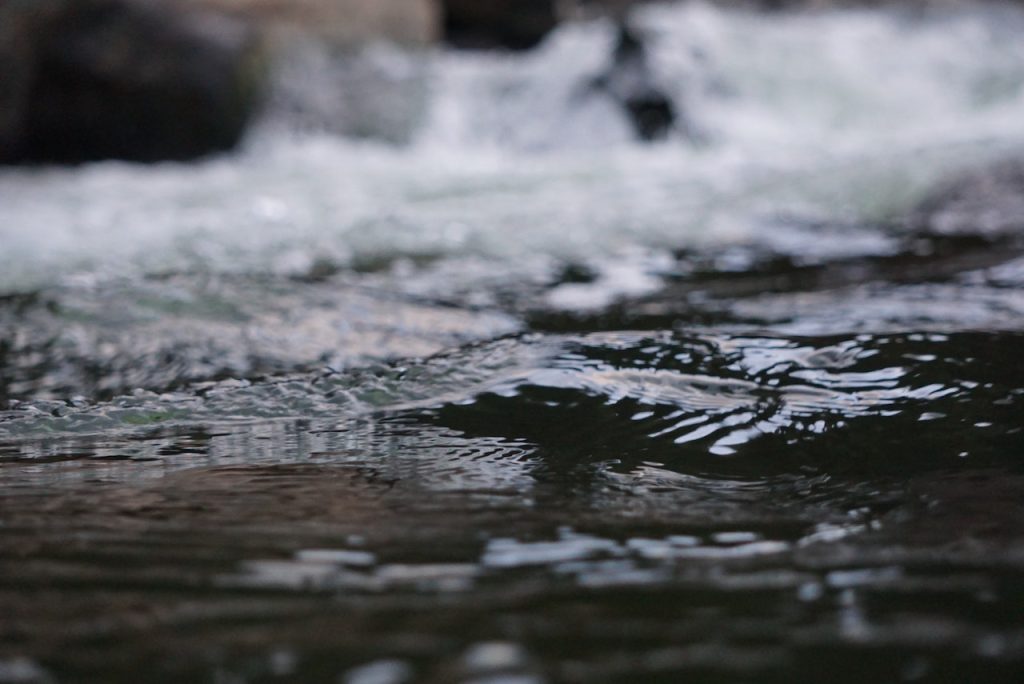 I heard the river rumbling, somersaulting in currents down toward the sea. Everything around us – the leaves, the rain, the airy nutrients – gravitated downhill with the river, including our tears, including my grief, anything with the slight weight of loss. O’Donohue calls this the “courage of a river” continuing to believe in the gradual descent of ground. I had no more words of my own, so I sang a song to match the plumb line of that courageous direction, my voice cracking from the strain of being honest. Dave knew the low rolling tune so he sang too, and Kyle hummed until we sang through the cycle again.
I heard the river rumbling, somersaulting in currents down toward the sea. Everything around us – the leaves, the rain, the airy nutrients – gravitated downhill with the river, including our tears, including my grief, anything with the slight weight of loss. O’Donohue calls this the “courage of a river” continuing to believe in the gradual descent of ground. I had no more words of my own, so I sang a song to match the plumb line of that courageous direction, my voice cracking from the strain of being honest. Dave knew the low rolling tune so he sang too, and Kyle hummed until we sang through the cycle again.
We sat a few minutes longer, wind shushing through us, until I said I was ready. The fire died enough that I could scoop some white ash into the jar of black char, a symbol of dark carbon absorbing the nutrition. We spread the stone circle back out and let the rain dowse the embers. I picked up a small smooth stone, warm to the touch, about the same size as one I plucked from the shelf in my apartment at the last minute before driving to the river. The one she gave me after the last time she left, with a note telling me she was giving me this small stone, “a little guy” that she’d put a lot of love into.
I didn’t want to let it go. I wanted to keep holding it with a special place on my shelf-top altar. I could have done so and doing so wouldn’t be wrong except I knew it was no longer right for me. The small stone was just large enough to block the threshold into the next room, the room made by walking and moving the grief and that one small stone with love in it.
Kyle and Dave crossed the river first, fumbling in the rapids with goofy grins and laughter. I waited in the otherworld, crouched on the rock-rolled shore beneath the Sycamore stand until they crossed. Then I waded into the same river where I had shouted my grief the summer before. I swam to midriver, slipped underwater to the underworld, braced myself against the turning current. I opened the jar and poured the ash and char into the pastel river, bending up by the mountain but carried down to the sea. I came up out of the river and across the threshold.
I later learned that Karla McLaren suggests five rules for a good ritual. First, be clear about your intentions, to know why you’re having the ritual in the first place. Second, mark a clear beginning, with a phrase or sound or movement, so you know what came before and what comes after. Three, define the location of your ritual, with clear boundaries to know where the edges are in time and place. Four, feed and tend your altar or shrine, to stay alert and aware for as long as the ritual lasts. And five, close the ritual with intention, with a phrase or sound or movement, clean up what needs cleaning, remove what needs removing, and celebrate because good work has been done.
The three of us sat on the trunk of a branch, worn smooth by water. I retrieved a pipe from our bundle of shirts in a stump, along with a jar of dried Mullein leaves. We lit a small fire in the bowl, passed it between us, puffing herbal smoke into the smoky rain. We didn’t talk, just smoked, a quiet sober celebration at the ritual’s end. Dave and Kyle grabbed their clothes and I stood at the water’s edge, small love-filled stone in hand. I let it go in an arc to midriver where it crossed the surface line of the water, following the liquid root down, a disposal to signify an end. A story in firm stone to heal a fault line. Maybe my grief wasn’t stuck, only unfinished. Maybe never quite done.
We passed along the soft path back up the creek, beneath the cathedral Cottonwoods and Sycamores. Kyle hugged us, got in the car back to Connecticut. Dave and I drove up out of the river’s floodplain and back into the heights of town.
***
ALMOST FOUR MONTHS later, Kyle and Dave came back to the watershed, only a score of miles upstream from our river threshold, for my wedding ceremony. The two of us, Christen and I, decided a few weeks after the ritual that we were ready to move into the next room, the biome beyond the many small disturbances. We stepped below the spring house and across the small stream that cuts below our new home, carrying the water down toward the creek that enters the river at the point where my friends and I crossed to release my grief. She and I stepped on stones over cool water to the gentle otherworld bank, to plant two little Willows while loved ones sang to us, waiting for us to cross back from our past grief, from the future of those Willow roots, to the present of our lives on the other side.


